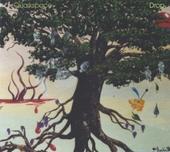First a psychedelic collective in the 1980s, Quarkspace grew up to become one of America's best space rock outfits from the 1990s. The group's albums have all been released on drummer Paul Williams' Eternity's Jest label and can be split into two categories: the "real" albums and the Spacefolds series. The latter chronicles the group's evolution by quickly releasing improvisations played at rehearsals. Quarkspace stemmed from a number of spin-off projects, the main ones being National Steam, the Ashtabula County Spacerock Big Band, and Church of Hed.
Quarkspace was formed in 1984 in Columbus, OH, and was first called Quark! College classmates Jay Swanson (keyboards), Darren Gough (guitar), and Kevin Wherry (bass) began to jam together and cover tunes by Frank Zappa, Camel, and Neil Young. Soon singer/songwriter Chet Santia and drummer Paul Williams joined and the group began playing frat parties and bars in and around Columbus. The general interest of the members quickly centered on psychedelic/space rock. But in early 1986, Santia and Williams left to concentrate on school, and, after carrying on with new musicians, Quark! disbanded a year later.
Swanson and Williams both made some home music and the latter started a small label, Eternity's Jest Records. Williams' befriending of West Coast guitarist Dave Wexler in 1991 gave an impetus to re-form the group, now under the name Quarkspace (a software company called Quark had arisen in the meantime). Santia, Swanson, Williams, and Gough formed the nucleus, and at first Wexler and another guitarist, Richard Fox, appeared as guests. The Spacefolds series began in 1996 as cassette EPs and a first full-length studio album, Quarkspace, was released the same year. The recording quality was tentative, but the group's talent shined. Gigs became more regular and included an invitation to play at the Strange Daze Festival. This concert at the biggest space rock event in North America established Quarkspace as a major act of the genre. Live Orion, recorded at Orion Studios in Baltimore, MD, solidified their reputation and garnered rave reviews. The group extended its turf up to New England, but never performed outside the U.S.
In the meantime Dave Wexler had become a regular member of the group, but his interest was fading and he soon disappeared. The Spacefolds series shifted to full-length CD format by 1999 (the four early cassettes were reissued on CD-R in 2001), the same year the group released the two-CD studio set The Hidden Moon. While Williams was becoming more and more familiar with studio techniques and the music business in general, other members saw the group as a sideline. Gough had already taken a few leaves of absence and by 2001 he bailed out, while his occasional replacement Stan Lyon became a permanent member, before leaving in 2005 to concentrate on his career as a grocery stocker extraordinaire.
By the end of 2001, Quarkspace had retired from live performance, although the group remained active as a studio unit. Drop, its strongest studio effort, was released in the public domain in November of that year. - Francois Couture, All Music Guide
Buy Quarkspace CDs here! (Get a free copy of our 4.5 star-rated CD DROP with every order!!)
